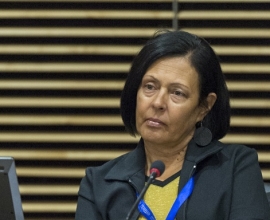"The healthcare reform supported by EUROsociAL was the most important in Uruguay since 2005"
30/09/2014
PrintElena Clavell, Director General of the Integrated National Health System
Uruguay has shown a strong institutional commitment to the EUROsociAL Programme since the first phase. In this second phase, it is participating in the thematic areas of Education, Social Policies, Public Finance, Justice, Citizen Security and Health. Precisely in the latter, it is playing a dual role of provider and beneficiary.
How would you characterise the reform of the healthcare system in Uruguay?
The healthcare reform, along with the reform of the tax system, is considered the most important structural reform Uruguay has undertaken since 2005. But, what's more, it's also the reform that has had the greatest redistributive impact.
And what has this reform achieved?
Before in Uruguay, constitutionally, the government only had the obligation to provide healthcare to indigents, and therefore it had a public hospital network and public services with very poor quality, almost in a state of neglect. Uruguay has not only made a heavy investment in these public services but in turn has also built a health insurance model based on contributions by citizens in proportion to income, by employers according to the size of their workforce, and by the government. This fund makes it possible to provide care to 75% of the population now, and in 2016 we will reach 80%.
¿What types of coverage does this new healthcare system provide??
They are related to the second major reform: a comprehensive healthcare system that includes all services and all medications, and which is mandatory at all healthcare centres. Universal coverage is guaranteed, including catastrophic care: transplants, cardiac surgery, oncology drugs and, in the case of HIV, anti-retrovirals.
Another effort is focused on making healthcare more accessible and more equitable.
In this reform process, we've considered implementing the recommendations of the World Health Organisation (WHO) and of the Rio+20 Conference for certain social determinants and their impact on the health of the population. One of the recommendations is to generate evidence, information the demonstrates the inequities and which makes it possible to review public accounts and have an impact on policy. While Uruguay has good indicators, they are still average, for example, for mortality. This system we're developing with the support of EUROsociAL—the health equity monitoring system—is about showing that these good results still are problematic.
And what is EUROsociAL's role in these reforms?
Already in the first phase of EUROsociAL, participating in the hospital governance group allowed us to see what others were doing and how they were doing it. This gave us a vision of other models, mainly that of Spain, but also of France and Italy, etc., to then look at which could be applied in our case.
In EUROsociAL II we've had the opportunity to allow the health line to choose this equity monitoring system project for health policy as a pilot project. This has made it a fundamental engine of the reform, both from the conceptual discussion to the most direct advising during implementation.
And what is the next step within the Programme?
Our commitment to EUROsociAL is to spread the word about the project: there have been regional activities, meetings with countries in which we are showing how we do things, and we're trying to transmit to other countries our enthusiasm about what it means to have a tool applicable to equity in health policies. We have some countries that are interested, such as Colombia, Costa Rica and, more recently, Peru. We are proud that EUROsociAL thinks we can handle this methodological transfer.
How would you characterise this South-South experience within the Programme
There's a lot of talk about South-South cooperation but, in reality, this cooperation requires a partner to help organise each part, because one side knows what it's doing and the other knows what it wants to do, but in the middle there is actually a cooperation methodology that we don't have in Latin America. As we say in Uruguay: someone has to set the table so others can sit down to eat. EUROsociAL sets the table, generates the areas, the knowledge and the exchanges of experiences. And in the case of Uruguay and other Latin American countries that are starting to become middle-income countries, and therefore are no longer just recipients of direct development cooperation efforts, EUROsociAL gives us the "how" of doing cooperation, the "how" of transferring knowledge.
And is there some other added value that you've received from EUROsociAL?
EUROsociAL added something that's very important for us, which is human capital. In both the first phase and this second one, we've made friends for the country and for the healthcare system, with which we exchange information, publications, visits, experiences, etc., and this is very important for us.
FIIAPP

